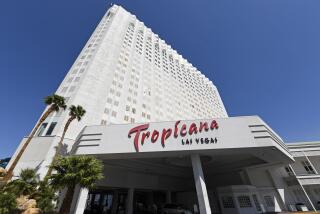When Baltic Ave. Becomes Park Place
- Share via
ATLANTIC CITY, N.J. — Flashy looking casinos line the boardwalk, towers of excess and opulence where high rollers drop hundred-dollar chips with such nonchalance that they might not notice if one fell on the carpet.
Blighted neighborhoods surround the casinos and are even illuminated by the neon signs of the gambling establishments. Homeless alcoholics beg for quarters, and a spare five-dollar chip could mean dinner.
Atlantic City is a place of stunning contrasts nearly a quarter-century after voters approved casino gambling in 1976.
This isn’t the way it was supposed to be. The town, long in despair, was supposed to be lifted up--not shunned--by the gambling industry. But, as new casinos were built in a narrow strip along the famed boardwalk and on seaside inlets, the city deteriorated. Streets became more infested with drugs, unemployment stayed high, schools remained bad.
Now, the landscape has started to change, slowly and quietly, unnoticed by the average gambler who shoots into town to eat, sleep and play.
Some neighborhoods, once wastelands of crumbling buildings and drug houses, have been replaced by suburban-style homes, tidy lawns and swimming pools. There’s a new senior citizens’ center, new community ice rink, new Boys and Girls Club, new minor-league baseball stadium and new convention center.
A supermarket--a necessity this city lacked for 25 years--has opened downtown, in an effort to persuade middle-class families to move here. Plans call for an enormous shopping district, improvements to the boardwalk, more housing.
And the casinos are paying for almost all of it.
As communities everywhere--from depressed counties in Mississippi to impoverished East St. Louis, Mo., and American Indian tribes across the country--introduce casinos in hopes of economic renewal, Atlantic City might foreshadow what becomes of a place that gambles its future on gambling.
The emotional swings can be jolting. For years, as this city decayed, there was anger and resentment, but nowhere else to turn. Now, with the casinos pouring more than $45 million a year into renewal projects, there is a level of optimism unseen since before World War II, when this seaside town was a trendy vacation spot for the Northeast.
“They’re not going to cure all the social ills of society, prevent kids from dropping out of school or teens from getting pregnant,” Mayor James Whelan said. “But we have resources most towns of 38,000 could only dream of. Most people have accepted them as a given. This is our industry. This is what we do. There isn’t a second industry here.”
Transformation Slow to Get Rolling
Numbers tell a story of dependence. Of the city’s $130-million operating budget, the casinos contributed $86.6 million last year through local taxes. Of the $199 million collected in property taxes, $160 million--roughly 80%--came from the city’s 12 casinos.
But that’s just the cash that goes into the city’s day-to-day operation.
The physical improvements are funded by an additional 1.25% of casino revenue collected by a state agency, the Casino Reinvestment Development Authority, which was created by a 1984 state law. Through that agency, which has become synonymous with development here, casinos have paid out $980 million in the last 15 years to capital improvement throughout New Jersey, mostly in Atlantic City.
Only in the last several years, however, has the overall climate begun to change, and pride among residents begun to grow.
“I never in a million years thought Atlantic City would look like this,” said Monica McQueen, a special-education teacher who used to rent an apartment in a shabby high-rise along the boardwalk. Today, she lives with her mother, sister and 4-year-old daughter in a new townhouse, built using CRDA money.
“Before this,” she said of the neighborhood once ravaged by drugs, “it looked like a dump.”
The city now has millions of dollars pouring in annually, above and beyond its budget, to be tapped for development. It has created options few cities in the country have. The development authority, for example, has created new housing units and, to persuade families to buy, has sold them at a loss.
The CRDA has a better deal for city residents who are willing to sell a crumbling rowhouse so it can be razed. The agency will buy the decayed home from a family for, say, $20,000, build a townhouse in its place that is worth $130,000, then sell it with a $20,000 price tag to the same family.
Such flexibility has allowed the agency to quickly transform once-blighted areas into stable neighborhoods--with roughly an even mix of former residents and transplants.
Many of the families work in casinos, while others work outside Atlantic City but wanted to live, affordably, near the beach.
Much of what the casinos are doing is motivated by self-interest, and not all of the CRDA money is going toward housing. With Native American-owned casinos--such as Foxwoods and Mohegan Sun in Connecticut, and possibly future ones in New York--threatening to take a chunk of this market soon, the casinos are pressing the agency to add attractions to the boardwalk, open a shopping district and give visitors more to do than play slots.
“They’ve never been more concerned, and realize you need to make this a destination resort,” said James R. Hurley, chairman of the state Casino Control Commission, which regulates gaming. “It’s a natural. Here’s the ocean. Here’s the sand. And Las Vegas proved if you can get people to stay three or four days for other things, they are going to gamble.”
More to Read
Sign up for Essential California
The most important California stories and recommendations in your inbox every morning.
You may occasionally receive promotional content from the Los Angeles Times.












